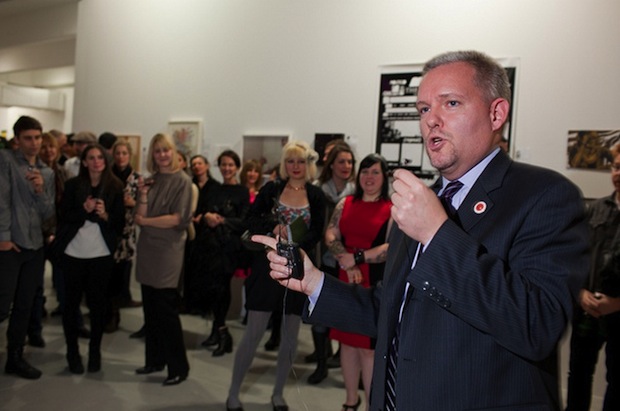As we noted in the primaries, the New York City mayoral race has been dismally lacking in awareness of the arts. So we were pretty psyched when Hyperallergic’s Mostafa Heddaya reported back in August that two New York City Council members, Stephen Levin and Jimmy Van Bramer, have proposed a bill “requiring the city to have a cultural plan.” The bill would force the city to assess the living conditions of artists, analyze their cultural priorities, and reorganize arts funding so that it can best serve the community, so that maybe this goddamn city will stop hemorrhaging artists to places like Baltimore, Philly, and New Orleans.
We called up Councilman Van Bramer (of Long Island City) to ask what his opinion of the current arts funding status is here. As the chair of the Cultural Affairs Committee, he’s basically the City Council’s spokesperson for culture, and has a pretty clear idea of what needs to happen. He was also a Gay City News reporter for several years, headed the Queens Borough Library, and he likes our name.
I’d read that you and Stephen Levin were proposing that the city make a cultural plan. What had you found in your analysis of the situation?
We’ve been talking about how New York City can remain an artist-friendly city in time of enormous rent increases, and pressures this economy puts on artists. Our bill, which we’ve worked on with Levin, calls on the city to present and analyze cultural priorities and talk about how different communities are being served. It would measure those in meaningful ways. [We could find out] if there are discrepancies, so that [underserved] pockets and areas are getting the financial support they need.
I think what’s really important is that we have a public plan, which has a serious and meaningful impact from the cultural community across all five boroughs. And that needs to be publicly presented to stakeholders all across the city, and the city and the Department of Cultural Affairs should be held accountable [to it]. The Department does support the arts and is doing a good job, but we can always do more and better.
There are other cities that have engaged in this and done a good job. Chicago has a cultural plan, not that we ever follow Chicago, but it’s actually quite impressive, thanks to Mayor Emanuel. They have an entire website that details what they did in Chicago and the plan they’ve developed as a result.
A lot of our friends are moving to Philly and Baltimore because they can’t afford rent. Do you believe in rent regulation for artists?
Absolutely, I’m a big proponent, not only of affordable housing, but stronger rent controls and regulations. Some of that is really on the state level, unfortunately. Speaker Quinn has long called for more city control over rent laws, and I concur. Part of it is making sure the city and City Council actually have a much greater role to play when it comes to rent regulation.
Another thing we can and must do when we have projects that have affordable housing as a component—there are often preferences [for certain communities]. There needs to be preference for the cultural community and artists as well. That would be a way of protecting a cultural presence in our communities.
In fact, if you look at a lot of the neighborhoods that are currently hot—Williamsburg or Long Island City—the truth is that artists really were the pioneers in those communities, and went to them when few others would. Because of their creativity, they created a place people wanted to go to. It’s ironic that they can’t afford to live there anymore.
That’s for sure. How often do the arts come up in City Hall and in what capacity? What could artists do to be better visible in politics?
Obviously in my office they come up every day, but I am the Chair of the Cultural Affairs Committee and was the President of Quinn’s Council on the Arts. So I live and breathe this issue, and am proud to be a chief advocate of this community. I think the Department of Cultural Affairs is a strong proponent of the arts, but clearly I don’t think they’re thought of or prioritized enough in government, generally speaking.
And artists aren’t heard from enough, that’s something I’ve said many times. I have been encouraged by groups like the League of Independent Theaters, who’ve made endorsements and held forums, asking people ‘what is your platform in the cultural community?’ For years, that never happened. I would always talk about, whether it’s the environmental or LGBT organizations—they would have candidate nights, forums—ask ‘what is your position’? The cultural community needs to do exact same thing. We’re a bloc of voters, and there’s immense power and talent there. Officials who want to get elected in this city should have a platform in the arts. Even if you’re not an artist, people who love the arts should demand that anybody who runs will increase funding for arts, for live/work spaces, so that artists who drive this city can continue to live work and create here.
Do you have a rough count of how many artists live here?
It’s really difficult to quantify. Norma Munn just retired, but she’s been head of [many cultural organizations] and founded the New York City Arts Coalition. She’s been asking that question for a long time. It’s almost impossible, but [the Coalition] tried to identify how many jobs are created … it’s a moving number, as you know, and a lot of folks are doing work under the radar in many different ways. Basically, it’s fair to say that any number we would come up with would be an undercount, whether its several thousand jobs, artists themselves, institutions, theaters, galleries.
The arts generates literally billions in revenue for this city. It’s massive. In some communities, it’s larger than others (mine especially), but it’s safe to say that no district in city of New York is without an artist population.
There may be some council members [who aren’t aware of cultural institutions in their districts] … but there are artists living in every single neighborhood, so this is everyone’s issue. Those members of that community need to be vocal, make themselves known. Those folks need to show up at town hall meetings, that may not be about culture or the arts—just say hey, my name is James Smith, I run a small independent theater company. I live here, I work here, and I want to know where you stand. That’s what needs to happen if we want to more accurately count those communities.
Anything you would hope to do for arts writers?
Uh, give you good copy? [Laughs] I hope that we can come up with a plan that will be worthy of coverage, and that the folks who are writing about the arts feel that it’s important and meaningful. The more cultural funding for programs and performances, the more people are talking about the arts, the more motivated and activated in community people are. Hopefully that would be good for everybody who works in and around the arts.




Comments on this entry are closed.